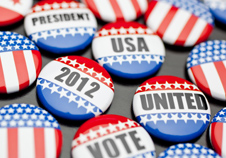Super PACs, the independent spend-only political action committees that support but cannot coordinate with political candidates, have reshaped political campaigns since the United States Supreme Court's decision in Citizens United v. Federal Election Commission in 2010. We asked Richard Arenberg, one political science lecturer at College of Social Sciences and Humanitiesto explain how Super PACs are reshaping the political landscape.
How have Super PAC political campaigns changed since Citizens United?
It's been almost exactly two years since the Supreme Court decided Citizens United v. Federal Election Commission by a 5-4 vote, and the damage to our political process from that decision and the Speechnow.org v. FEC decision that followed is still unfolding . It is already clear that the twin equations of corporations equaling people and unlimited independent contributions equaling free speech have distorted, if not corrupted, the campaign finance system.
Super PACs are able to raise unlimited amounts of money from corporations, unions and individuals, and are able to spend huge sums to support or attack specific candidates. All of this takes our political campaign fundraising almost back to the pre-Watergate days of brown paper bags full of cash. Unknown (in any current sense) and almost uncontrollable funds from special interests and giant corporations, multinational in nature, distort political campaigns. Aggressive and negative attacks made by Super PACs on opponents on behalf of candidates absolve the candidate of liability for the ad. Romney, for example, claimed he couldn't tell the Super PACs supporting him what to do without breaking the law. Even more alarming than the proliferation of shadowy negative attacks is the inevitable increase in influence that massive contributions from individuals, unions and corporations will promote.
While candidates themselves are not allowed, do campaigns and outside stakeholders work with or strategize with Super PACs?
Almost without exception, the Super PACS involved in the 2012 campaigns are formed and led by former staffers, fundraisers and associates of the candidates. While it is difficult to know the details of whether actual direct coordination takes place, the legal fiction that these are “independent” entities is obvious even to casual outside observers.
Presidential candidates benefit from multimillion-dollar ad buys, many of which support registered Super PACs, wring their hands and bemoan the impact on campaign spending—often even greater than the campaigns themselves—from them the “independent” entities. The result of this travesty is deepening public cynicism about the political process. Comedian Stephen Colbert has pointed out the hypocrisy of running a fake presidential campaign that benefited his Super PAC brilliantly named “Definitely Not in Coordination with the Stephen Colbert Super PAC.”
What are the chances that Congress will pass new legislation to limit the influence of Super PACs? What factors would influence such a decision?
While Congress never tackles campaign finance reform quickly, there are incremental steps Congress can take, such as strengthening disclosure requirements that would restore some level of accountability to the public. However, Supreme Court decisions limit Congress' options. Short of a change of heart by the Court or a change in its composition, the main option for overturning the decision is an amendment to the Constitution. This, of course, is a long and difficult process that requires a two-thirds vote in both the House and Senate and then ratification by three-quarters of the states. Without strong and sustained public demand for action, the prospects for such amendments are dim.



